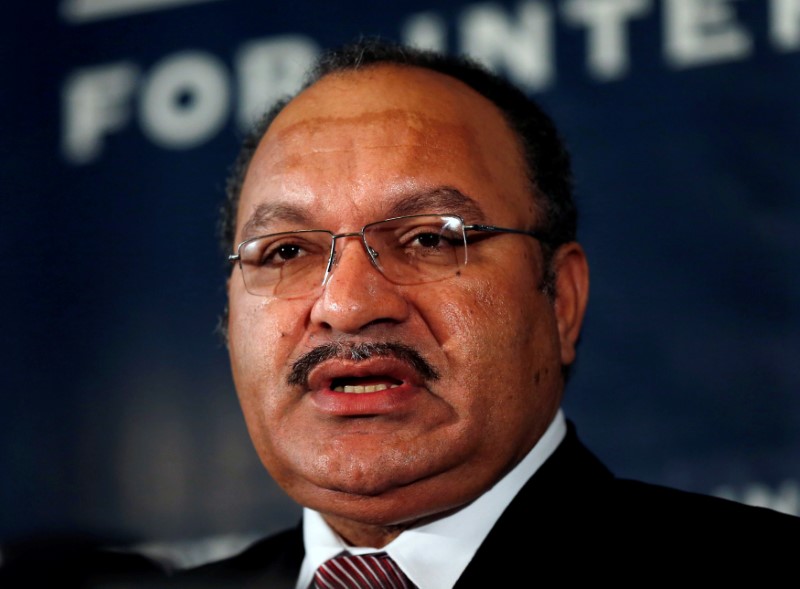SYDNEY (Reuters) – The parliament of Papua New Guinea (PNG) will elect a prime minister at the end of the week, lawmakers said on Monday, in an election marred by poor organisation and opposition accusations of electoral roll irregularities.
With no political party able to clinch enough seats to form a government, analysts said the outcome remained too close to call, stirring voter frustration that could trigger more unrest in the resource-rich South Pacific nation.
On Saturday, incumbent Prime Minister Peter O’Neill was invited to try to form a coalition government, with his party on track to win the largest number of seats, although fewer than half the 56 needed, forcing him to woo coalition partners.
“The ruling People’s National Congress and the main opposition, the National Alliance party, each believe they have the numbers, it is very close,” said Jonathan Pryke, a research fellow at Australian think-tank the Lowy Institute.
Wednesday’s vote to determine PNG’s next parliamentary speaker will offer a clue to which party has the necessary support to win the prime ministerial vote, analysts say.
However, both decisions are unlikely to be made by a full complement of lawmakers, as vote counting continues after polls had to be extended when a large number of voters were unable to cast ballots.
PNG voters went to the polls to elect a new 111-member parliament in late June, but use of an electoral roll dating from 2012 meant many voters could not vote, forcing an extension of a two-week window.
Most of PNG’s nearly 8 million people live at subsistence level on islands, atolls and in remote mountain villages, despite the country’s mineral wealth, evidenced by energy giant Exxon Mobil’s $20-billion LNG plant.
“It is most unlikely that all seats will have been declared by Friday,” said a source close to the main opposition National Alliance Party, who declined to be named as he was not authorised to talk to the media.
“The numbers won’t matter, the prime minister will be determined by the majority present on the day.”
Voter dissatisfaction with the election triggered sporadic violence nationwide, but O’Neill’s re-election could stoke more tension, as many are disenchanted by corruption allegations against him that he denies.
The winner faces a tough economic task, with the 2016 budget deficit of 34 percent of GDP having doubled from 2012, worsened by a slump in energy prices.
A 2016 drought crippled farming and halted production at the largest copper mine, by cutting off river transport and so fuel supply.
PNG must also grapple with fallout from plans to close an Australian-run detention centre home to just over 800 refugees, mainly from South Asia and the Middle East.
(Reporting by Colin Packham; Editing by Clarence Fernandez)
Copyright 2017 Thomson Reuters. Click for Restrictions.




1 comment
Colin – under the relevant Organic Law the party which garners the most votes is invited to form Government – they then have to create/persuade a coalition to achieve that and have for many elections past. If they don’t/can’t and other parties can, then they will form Government. Pretty democratic process. And yes, I’ve heard all of those arguments and allegations of buying support – for the past 3 elections at least, and about the side which is now levelling the same allegations at the PNC. There was no way any of the outstanding 18 seats could change the ratio of seats won by the PNC. The Parliament then elects the PM, following days of Melanesian negotiating processes which we have no idea how to work with or understand. Yes there have been some problems with the election, but for goodness sake let’s not beat up a country which is trying to retain some semblance of decency as it continues it’s transition to a modern democracy. I’ve lived here for the best part of 10 years, through 3 elections, and nothing is as it seems and we do not help when we criticise with half the facts. A well functioning Opposition is an option for this country which MPs and the community need to consider and embrace. Accountability will improve but on PNG’s terms. We are not without our major electoral problems, corruption challenges, and issues of trust and decency. In Australia’s case our ability to take the high moral ground on anything here now is pretty questionable. Our treatment of PNG and refugees is one of the worst atrocities we’ve committed here – and both sides of the political divide have played that game with massive consequences for refugees, PNG and Australia’s reputation. I haven’t even started on the implications of the austerity measures we were part of forcing on PNG in the late 1990s which continue to ricochet through the public service and the economy. Measures which are now being recanted globally. Time to put away our opinions, our privilege, and our cultural imperialism and let the country work out its own future with more listening and more balanced reporting.